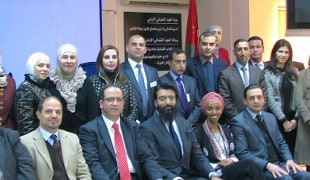Max Planck Foundation delivers the first in a series of workshops with the Judicial Institute of Jordan
Underscoring the strong cooperation between the Judicial Institute and the Max Planck Foundation, experts from the Foundation delivered the first in a series of workshops for judges of the ordinary courts in Jordan. The workshop was complemented with presentations from two senior judges from the Jordanian courts who presented papers on the procedural hierarchy of courts in Jordan and the consideration of constitutional principles by domestic courts.
The workshop was designed and delivered to align with the Foundation’s wider approach to provide support to the Constitutional Court and the Judicial Institute in Jordan. It is envisaged that this approach will help to increase the understanding of ordinary court judges of the functions of the newly created Constitutional Court, outline the procedures for referring questions of constitutional relevance to it and strengthen the constitutional and court system overall. The subjects covered during the workshop and the ensuing discussions will, in the long term, contribute to enhanced compliance with the modified court system.
The workshop presentations were approached from a comparative legal perspective, using examples of constitutional court practice from the region and abroad. This approach provided the judges with improved insight into the functions and experiences of constitutional courts in both long-established and newly-formed constitutional court systems and the opportunity to analyse the relevance of various models for the Jordanian legal system.
The workshop was inaugurated with an opening address by H.E. Dr. Tha’er al-Adwan, Director of the Judicial Institute of Jordan (JIJ). The workshop was conducted at the premises of the Judicial Institute and was attended by 23 serving and trainee judges. Enhanced cooperation between the Max Planck Foundation and the Judicial Institute will continue to be strengthened, with two further workshops with the Judicial Institute planned during 2015, and further technical expertise on principles of constitutional law and the role and functions of the Constitutional Court.

